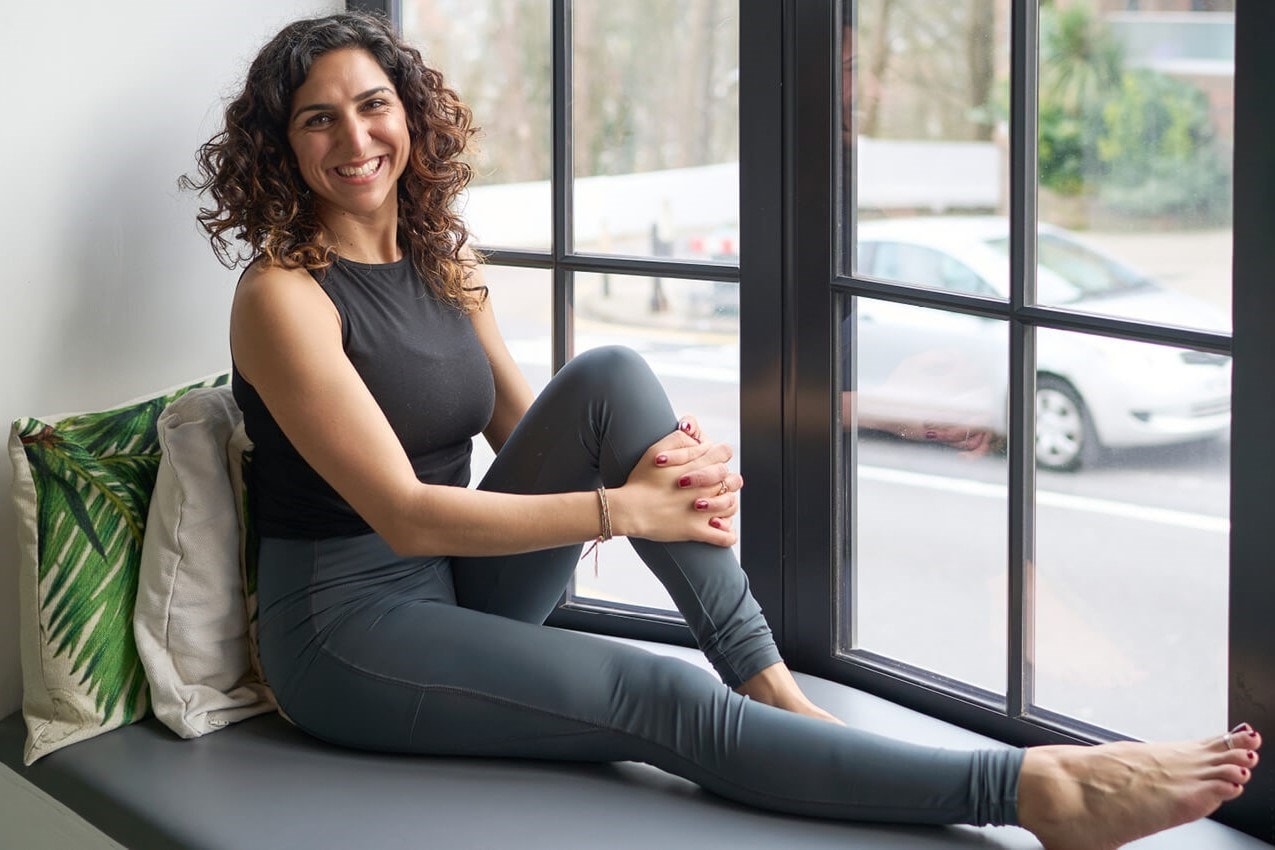- About Us
-
Help
Free 1:1 supplement advice
Not sure which supplement is right for you? Book a free, 15 minute telephone call with one of our nutritional experts.
Book your free consultationGet in touch (Mon to Fri, 9am - 5pm)
Customer Service: +44 (0) 1264 339 770
Order Enquiries: +44 (0) 1264 363 193
Contact us - Stockists
You are on the UK site
Hello US customer, you are currently shopping on the UK site. To ensure you are charged in the correct currency and receive accurate shipping costs, please switch to the US website and re-add your product to your basket.
You're away from FREE UK delivery Free UK delivery (applied at checkout) on orders over £10.00
You have qualified for Free UK delivery
Lifestyle
Dr Rabia's top 5 tips to support gut health
Starting and maintaining a healthy lifestyle can be challenging, especially when the weather is cold and dreary. But it’s never too late to get going!
We all very much enjoyed Channel 4’s Know Your Sh!t programme here at Optibac and found it very inspiring. The series is full of gut health hacks from a team of experts, and useful information to make people feel better informed and reassured about their digestive health. I was therefore delighted to sit down with one of the Know Your Sh!t expert medical team, Dr. Rabia Topan, to discuss her top tips to support gut health.

Dr. Rabia is a Gastroenterologist with a special interest in Irritable Bowel Syndrome (IBS) and the gut-brain relationship. As well as being a medical doctor, Dr. Rabia is also a qualified yoga teacher, hypnotherapist and breathing instructor. She firmly believes that the mind and body are closely connected, and supports her patients with a holistic approach, using evidence-based medicine to offer self-empowering solutions for gut health issues.
Read on to learn 5 simple but effective tips from Dr Rabia:
1. Get to know your gut
We often turn to professionals to help us when we experience unpleasant symptoms, but if we take a little time to tune into our body first, we can gain a better awareness of what is driving 'dis-ease.' Greater awareness is the first step to understanding how our lifestyle can influence our gut health and/or provoke symptoms.
Dr. Rabia recommends that one of the best and simplest ways of monitoring symptoms is to keep a symptom diary. There are various ways to do this: you could use your favourite notebook by your bedside at the end of each day, use an app on your phone, or a smart watch, to help you to track your diet, lifestyle, and your symptoms. Ideally keep the diary for at least 2 weeks, to provide a thorough overview of what may be triggering your symptoms.
Dr. Rabia advises that your symptom diary should record information about the following areas:
- Bowel habits
- Meals and snacks
- Caffeine and alcohol intake
- Exercise regime
- Sleep patterns
- Stress levels
2. Manage your stress levels
We're all familiar with the saying 'gut feeling', but many people are unaware that the brain and gut are physically connected via the nervous system. Specifically, the vagus nerves link the intestinal nervous system to the central nervous system (CNS) and control our digestion. Via this connection, stress that we feel in our heads may negatively impact the gut microbiome. ‘Distress signals’ can be carried through the nervous system to the gut when the body experiences physical or emotional stress1 causing inflammatory responses which can adversely affect the health of our gut lining and promote the growth of bad bacteria2.
As mentioned in tip number 1, Dr. Rabia suggests that monitoring your stress as part of your symptom diary can help you to start noticing how your mental health impacts your gut health, which can be a helpful start to your gut-healing journey. Listen to Dr. Rabia’s gut-brain meditation recording here.
You can read more about the Microbiome and the Gut-Brain Axis on the Probiotics Learning Lab.
3. Exercise can help bloating
Dr. Rabia explains how relaxation of our core abdominal muscles when eating can contribute to bloating. Our abs should normally tighten after we eat to keep everything in place. If our abs are weak, this can cause our belly to balloon out, and an increase in our belly size is associated with feeling bloated. To strengthen our abs, Dr. Rabia recommends core-strengthening exercises. If you suffer with regular bloating, you may want to join a gym and try weight-lifting exercises to strengthen your core.
As both a qualified yoga instructor and Gastroenterologist, Dr. Rabia has developed Yoga for IBS – a programme to reduce pain, fatigue and anxiety associated with IBS symptoms. In clinical trials involving IBS patients3,4 who practised yoga either in-person or via virtual sessions, patients experienced fewer, less severe symptoms and a reduction in anxiety. In another trial5 looking at the effects of either yoga or a low-FODMAP diet on IBS over a 12-week period, yoga was found to be as effective as the FODMAP diet in reducing symptoms. These results indicate that yoga is a safe and feasible lifestyle intervention which may benefit physical symptoms and overall quality of life for IBS sufferers.
This research supports the need to take a holistic approach to IBS management, incorporating a combination of exercise and stress-reduction techniques to manage symptoms.

4. Eat fresh, unprocessed food
There’s no need to buy special foods when embarking on a protocol to support your gut health. In fact, the reverse is true! Dr. Rabia recommends keeping foods as simple as possible and opting for fresh, unprocessed foods: vegetables, fruits, well-soaked beans and pulses, grains, eggs, lean meat and fish – in their natural forms. This is what your gut likes best.
Because highly processed foods are often full of added sugar, salt, hydrogenated oils and chemical additives, regular consumption is associated with a variety of serious health issues including obesity, high blood pressure and heart conditions7. Of course, processed foods are designed to be convenient and appealing, and for those of us with busy lifestyles they can be difficult to refuse. Making healthier choices can be more expensive and time-consuming, especially while you’re still learning which foods to choose, and requires a good deal of commitment. This can cause some anxiety over your diet, which is counter-productive for your gut health.
So, rather than causing ourselves additional stress by adopting a diet which is difficult to stick to, Dr. Rabia suggests following the ‘80:20 rule’, which means that you choose to eat nutritious, healthy, unprocessed foods 80% of the time, while 20% of the time you can choose your favourite treats and/or convenience foods. This takes some of the pressure off and makes it more achievable to maintain a gut-friendly diet.
5. Not everyone needs to be gluten or dairy free!
If you experience digestive symptoms or are diagnosed with IBS, it is sensible to consider whether specific foods are triggering your symptoms. Gluten-containing grains such as wheat, rye and barley as well as dairy (cow’s milk-based) foods, are often the first food items that people consider excluding.
Gluten is a protein found in a variety of different grains – in particular, wheat. Coeliac disease is the most extreme form of gluten sensitivity. It is actually an autoimmune condition and currently affects around 1% of the world’s population, although this number appears to be increasing year-on-year8. To make a diagnosis of IBS it is important to ask your GP for a blood test to rule out coeliac disease.
Yet IBS is present in approximately 5% percent of the global population9 – and it is usually non-coeliac gluten sensitivity which is the most common cause of symptoms from gluten. With this type of intolerance, sufferers may still be able to tolerate some gluten-containing grains like ancient grain spelt sourdough bread, which is fermented and the gluten partially broken down by bacteria before consumption. This is important to remember because many gluten-free products contain added sugar and preservatives to make them taste good; i.e. they are processed foods – see tip number 4! Another cause for IBS symptoms, with foods like bread or pasta, is the fact that wheat contains fructans, a fermentable carbohydrate commonly excluded in the low-FODMAP diet. If this sensitivity is the cause of your IBS symptoms, then portion size can make all the difference, and it is likely that you can still tolerate small amounts rather than exclude wheat from your diet altogether.
Dairy sensitivities tend to fall into two categories: a true allergy to dairy protein or an inability to digest the sugar in dairy, which is called lactose. True allergies result in extreme, sometimes life-threatening, symptoms which are not limited to the digestive system – read more about the difference between food allergies and intolerances. Lactose intolerance typically causes unpleasant but less serious digestive symptoms such as pain, bloating and loose stools. Approximately 68% of the world's population is believed to be lactose intolerant10 so plant-based milk alternatives are becoming very popular. However, when switching to plant milks, e.g. oat, rice or almond milk, it is important to note that the nutritional profile of plant-based milks (and related products) is very different to dairy milk, which is nutrient-dense and full of vitamins and minerals such as calcium and protein. Therefore, switching to plant milks will not be ‘like for like’ and you will need to ensure you are supplementing the rest of your diet accordingly.
It’s a similar story with gluten-containing grains which offer protein, fibre and B vitamins, whereas many commercial gluten-free foods are highly processed and low in nutrients. With this in mind, cutting out any food groups should be done in a very organised way, and ideally with professional guidance, so there is no risk of nutritional deficiency. Furthermore, restricting your diet can be stressful and cause anxiety, so should only be done when there is a genuine food allergy or intolerance11.
Dr. Rabia recommends that if you have a diagnosis of IBS, the most sensible approach is to eliminate either lactose or gluten for 6 weeks (not at the same time otherwise you won’t know which is causing the issue). If this makes you feel noticeably better, then you know the food is a trigger for you but if not, then reintroduce the foods little by little to avoid restricting your diet in the long term.

We want to thank Dr. Rabia so much for sharing her thoughts and expertise with us, and hope you find her great tips helpful. You can follow Dr. Rabia on Instagram @doctor_rabia, or visit her website.
If you enjoyed reading this article, you may find these others of interest:
Dr. Aisling’s 7 Top Tips to Feel Less Stressed
Our Microbiologist’s Tips for Winter Health
Feel More Energised: 9 Tips from Our Sports Nutritionist
References:
- Madison A, Kiecolt-Glaser JK. (2019) Stress, depression, diet, and the gut microbiota: human-bacteria interactions at the core of psychoneuroimmunology and nutrition. Curr Opin Behav Sci.:105-110. doi: 10.1016/j.cobeha.2019.01.011. Epub 2019 Mar 25. PMID: 32395568; PMCID: PMC7213601.
- Zeng, M., Inohara, N. & Nuñez, G. (2017). Mechanisms of inflammation-driven bacterial dysbiosis in the gut. Mucosal Immunol 10, 18–26 https://doi.org/10.1038/mi.2016.7
- D'Silva A, Marshall DA, Vallance JK, Nasser Y, Rajagopalan V, Szostakiwskyj JH, Raman M. (2022). Meditation and Yoga for Irritable Bowel Syndrome: A Randomized Clinical Trial. Am J Gastroenterol. doi: 10.14309/ajg.0000000000002052. Epub ahead of print. PMID: 36422517.
- Schumann D, Anheyer D, Lauche R, Dobos G, Langhorst J, Cramer H. (2016) Effect of Yoga in the Therapy of Irritable Bowel Syndrome: A Systematic Review. Clin Gastroenterol Hepatol.;14(12):1720-1731. doi: 10.1016/j.cgh.2016.04.026. Epub 2016 Apr 22. PMID: 27112106.
- Schumann D, Langhorst J, Dobos G, Cramer H. (2018) Randomised clinical trial: yoga vs a low-FODMAP diet in patients with irritable bowel syndrome. Aliment Pharmacol Ther. ;47(2):203-211. doi: 10.1111/apt.14400. Epub 2017 Oct 27. PMID: 29076171.
- NHS. (n.d.). Eating Processed Foods. NHS choices. Retrieved January 24, 2023, from https://www.nhs.uk/live-well/eat-well/how-to-eat-a-balanced-diet/what-are-processed-foods/
- Chen X, Zhang Z, Yang H, Qiu P, Wang H, Wang F, Zhao Q, Fang J, Nie J (2020). Consumption of ultra-processed foods and health outcomes: a systematic review of epidemiological studies. Nutr J. 20;19(1):86. doi: 10.1186/s12937-020-00604-1. PMID: 32819372; PMCID: PMC7441617.
- King J, Jeong J, Underwood F, Quan J, Panaccione N, Windsor J et al. (2020). Incidence of Celiac Disease Is Increasing Over Time: A Systematic Review and Meta-analysis. American Journal of Gastroenterology.;115(4):507- 525.
- National Institute for Health and Care Excellence. (2022) Irritable Bowel Syndrome: How Common Is It? (n.d.). Retrieved January 24, 2023, from https://cks.nice.org.uk/topics/irritable-bowel-syndrome/background-information/prevalence/
- Bayless TM, Brown E, Paige DM. (2017) Lactase Non-persistence and Lactose Intolerance. Curr Gastroenterol Rep. May;19(5):23. [PubMed] [Reference list]
- Lerner A, O'Bryan T, Matthias T. (2019) Navigating the Gluten-Free Boom: The Dark Side of Gluten Free Diet. Front Pediatr.;7:414. doi: 10.3389/fped.2019.00414. PMID: 31681712; PMCID: PMC6803387.
.png?lang=en-GB)
